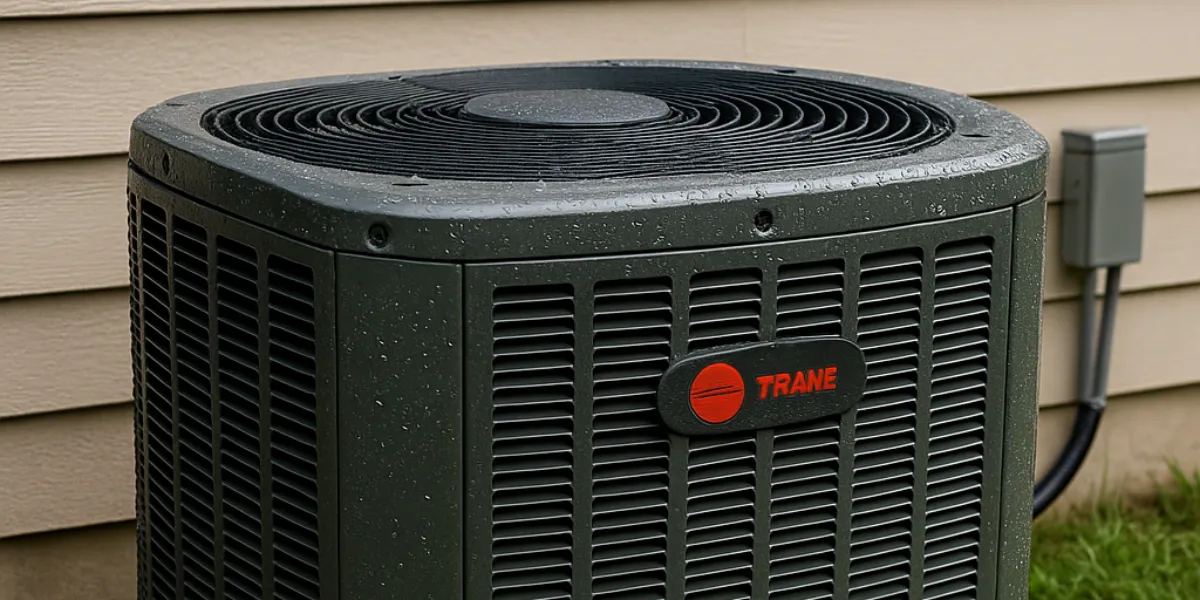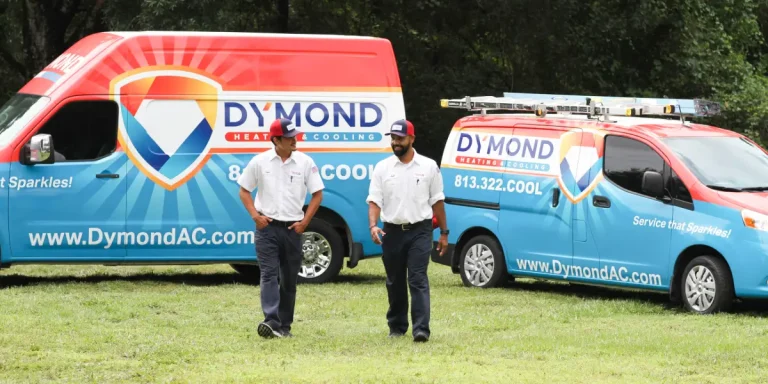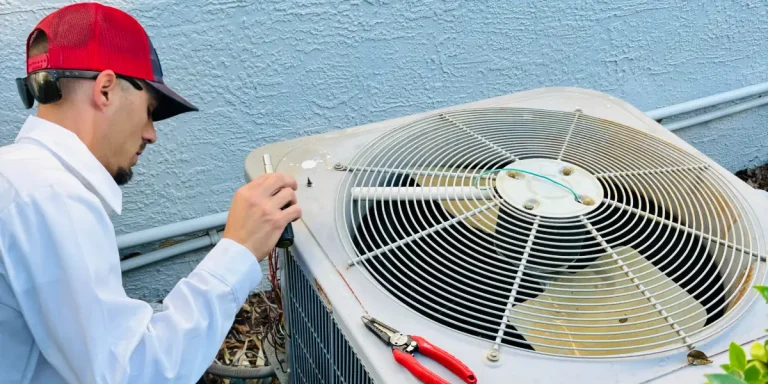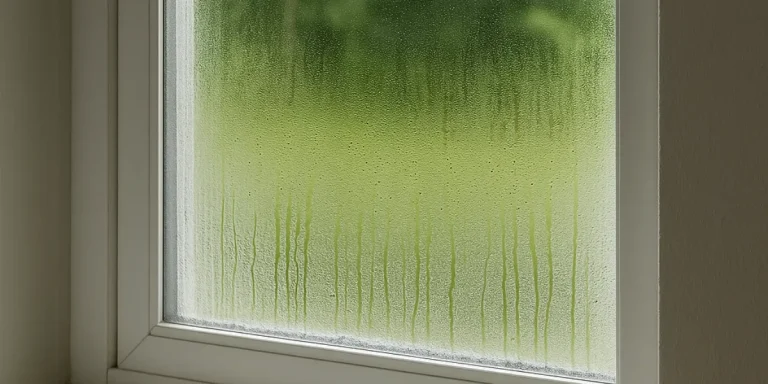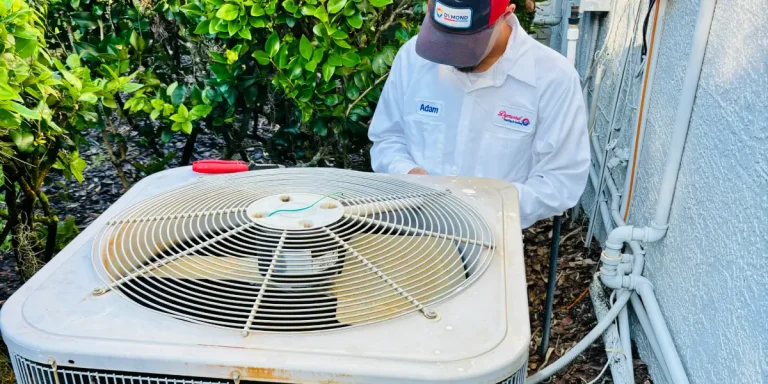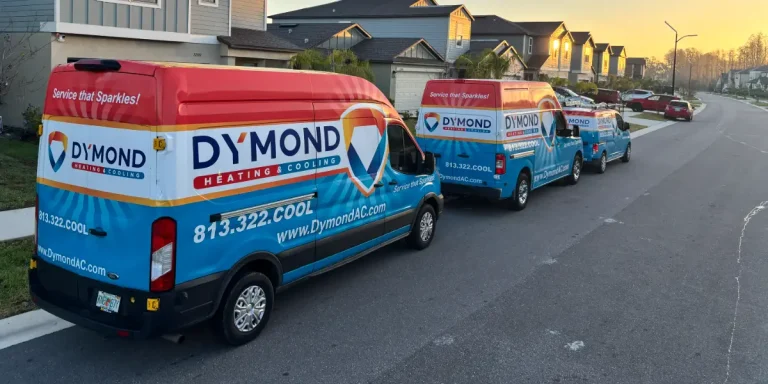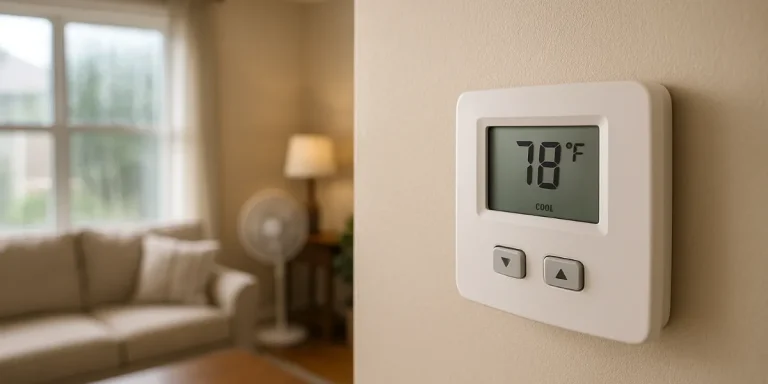What to Do If Your AC Freezes Up
If your air conditioner suddenly stops cooling and you discover a layer of ice forming on the outdoor unit or refrigerant lines, you’re likely dealing with a frozen AC system. It’s a common issue in Florida’s hot and humid climate, but ignoring it can lead to serious damage and expensive repairs. Understanding what causes an AC to freeze up—and what to do next—can help you restore comfort and avoid long-term system problems.
Why does an air conditioner freeze?
A frozen air conditioner might seem surprising—especially in the Florida heat—but it’s actually a fairly common issue. Your AC system depends on a careful balance of airflow, refrigerant levels, and proper temperature regulation. When that balance is disrupted, the evaporator coil inside your system can become too cold. As condensation forms on the coil, it can freeze instead of evaporating, leading to ice buildup that interferes with your system’s ability to cool your home effectively.
As the ice continues to accumulate, it restricts airflow even further. This makes your system work harder, reduces cooling efficiency, and increases the risk of long-term damage.
Common causes of a frozen air conditioner
Restricted airflow is one of the most common culprits. If air can’t move freely through your system, the evaporator coil won’t get enough warm air passing over it. This can be caused by dirty air filters, closed or blocked vents, or issues with your ductwork. Without enough airflow, the coil temperature drops too low and causes freezing.
Low refrigerant levels are another major cause. Refrigerant plays a key role in absorbing heat from your home and releasing it outdoors. If the system is low on refrigerant—often due to a leak—it can’t transfer heat effectively, which leads to a supercooled coil and eventual freeze-up. Any refrigerant issue should always be handled by a licensed HVAC technician.
Thermostat problems can also contribute. A faulty or miscalibrated thermostat may let your AC run longer than necessary, cooling the coil too much. Poor placement—such as near windows, vents, or heat-generating appliances—can also cause incorrect readings that confuse your system.
Dirty coils or filters restrict the heat exchange process. When the evaporator coil becomes coated in dirt, grime, or mold, it can’t absorb heat as efficiently. Similarly, a clogged filter limits airflow, both of which can cause freezing.
Blower fan malfunctions may also be to blame. The blower moves air across the evaporator coil. If it’s failing or running too slowly, airflow drops and the coil may freeze. You might also notice weak airflow, odd noises, or inconsistent temperatures if your blower is having issues.
What happens if you ignore a frozen AC?
If left untreated, a frozen air conditioner can cause a number of problems. The compressor may become damaged due to excessive pressure or overheating. Water leaks can occur as ice melts, especially around the indoor unit. Your energy bills may rise as the system struggles to keep up. In the worst-case scenario, ignoring the problem could lead to full system failure and a costly replacement.
That’s why it’s important to act quickly. If you notice ice forming on your AC, turn it off and call Dymond Heating & Cooling. Our licensed technicians will diagnose the issue, make the necessary repairs, and help ensure your system is operating efficiently and reliably—no matter how hot it gets outside.
Step-by-step: What to do if your AC is frozen
If you notice ice buildup on your air conditioner—either on the refrigerant lines, the indoor coil, or the outdoor unit—it’s important to act quickly. A frozen AC won’t cool your home properly, and if ignored, it can damage your system’s components and lead to more expensive repairs.
Follow these steps to safely address the issue:
1. Turn off your AC immediately
The first thing you should do is shut the system down to stop further damage. Running your air conditioner while it’s frozen can strain the compressor and cause it to overheat.
-
-
- Set your thermostat to “Off”
- Switch the fan setting to “On” instead of “Auto”
-
Turning the fan on helps push warm indoor air over the frozen coil, which will speed up the thawing process without forcing the system to operate in a compromised state.
2. Let the system thaw
You’ll need to give the system time to defrost naturally. This could take anywhere from a few hours to a full day, depending on how much ice has formed.
-
-
- Do not attempt to scrape or chip the ice off yourself—this can damage delicate parts like the refrigerant lines or coil fins.
- Place towels under the air handler if necessary, as melting ice may cause water to drip.
-
If the ice doesn’t begin to melt after several hours, there may be a deeper issue preventing airflow or proper temperature regulation.
3. Check your air filter
Once the ice begins to thaw, take a look at your air filter. A dirty or clogged filter is one of the most common causes of AC freezing.
-
-
- Remove the filter from its slot and hold it up to a light. If you can’t see through it, it’s time to replace it.
- In Florida’s hot, humid climate, we recommend checking and replacing your air filter every 30–60 days—or more frequently if you have pets or allergies.
-
Clean airflow is essential to keep the evaporator coil from freezing again.
4. Inspect vents and airflow
After replacing your filter, walk through your home and inspect your vents:
-
-
- Make sure all supply and return vents are fully open
- Look for furniture, rugs, or curtains that might be blocking vents
- Avoid closing off too many rooms, as this can cause pressure imbalances and reduce airflow
-
Good airflow is critical for keeping your system operating efficiently and preventing coil freeze-up.
5. Schedule a professional inspection
If your system keeps freezing after taking these basic steps—or if it’s the second or third time it’s happened—you likely have a deeper issue that needs professional attention.
The team at Dymond Heating & Cooling can:
-
-
- Test your refrigerant levels and check for leaks
- Clean dirty evaporator or condenser coils
- Inspect and test your blower motor
- Check your thermostat settings and wiring
- Evaluate ductwork for hidden restrictions
-
We use advanced diagnostic tools to pinpoint the exact cause of your frozen AC and recommend the most effective fix. Whether it’s a simple tune-up or a more complex repair, our licensed technicians will restore your cooling system with precision and care.
Common causes of frozen AC systems
Let’s take a closer look at what might be behind the issue.
Restricted airflow
Poor airflow is the number one reason air conditioners freeze. This can result from:
- Dirty filters
- Closed vents
- Blocked ductwork
- Failing blower fan
When airflow is limited, the evaporator coil gets too cold, and moisture in the air freezes on contact.
Low refrigerant
If your system is low on refrigerant due to a leak or improper charge, it can’t absorb enough heat. This causes the coil to drop below freezing, and ice begins to form.
Low refrigerant is a serious issue that should only be handled by a licensed HVAC technician. Our team at Dymond Heating & Cooling uses advanced tools to detect leaks, repair them safely, and recharge the system according to manufacturer specifications.
Dirty coils
Dirt and dust on your evaporator coil insulate the surface and interfere with heat transfer. When this happens, condensation can freeze instead of draining properly. Coil cleaning is included in our routine HVAC maintenance plans, which can help prevent this problem entirely.
Thermostat or fan problems
If the blower motor doesn’t run correctly, or if your thermostat isn’t sending the right signals to your system, the coil may become too cold. You may notice your home feels humid or that the AC turns on and off frequently (short cycling). These are signs of a deeper control issue that needs attention.
Can you prevent your AC from freezing?
Yes—and it starts with proactive care. Here’s how you can reduce your risk:
-
- Replace air filters regularly (every 1–3 months)
- Keep vents open and clear
- Schedule seasonal HVAC tune-ups
- Have refrigerant levels checked annually
- Invest in professional duct cleaning if you suspect airflow problems
At Dymond Heating & Cooling, we offer preventative maintenance plans tailored to Florida homes, including full inspections, coil cleaning, airflow testing, and system calibration to help prevent common AC problems like freezing.
When to call for help
If you’ve already turned off your system, checked your filters, and let the ice melt—but your AC still isn’t working properly—it’s time to bring in the pros. Continuing to operate a frozen AC can damage the compressor, shorten your system’s lifespan, and result in high energy bills without actually cooling your home.
Whether you need emergency AC repair, a refrigerant recharge, or help diagnosing a hidden issue, Dymond Heating & Cooling is here to restore your comfort quickly and professionally.
Proudly Serving Pasco County and Beyond
We provide fast, friendly, and expert HVAC service throughout:
Call Today to Fix Your Frozen AC Fast
Don’t let a frozen AC leave your family sweating.
Call Dymond Heating & Cooling for fast diagnosis and repair, or request a free estimate for service. Our licensed technicians are experts in AC repair, heat pump service, and full HVAC maintenance for homes throughout Pasco County and the Tampa Bay area.
Call now or schedule online—we’ll get your home back to cool comfort in no time.

